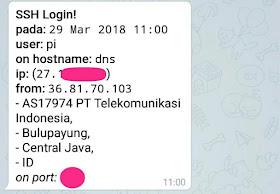Pernahkah anda berfikiran ingin memantau siapa saja yang login dan mendapat laporan ketika ada user yang masuk ke box Anda ? api telegram solusinya.
Baiklah, pertama tama simak script berikut ini
# simpan file ke /etc/profile.d/
USERID="213567634"
KEY="930289293:AAGn69QpFJKdlwkaJDLWADkladwa"
TIMEOUT="10"
URL="https://api.telegram.org/bot$KEY/sendMessage"
DATE_EXEC="$(date "+%d %b %Y %H:%M")"
TMPFILE='/tmp/ipinfo-$DATE_EXEC.txt'
if [ -n "$SSH_CLIENT" ]; then
IP=$(echo $SSH_CLIENT | awk '{print $1}')
PORT=$(echo $SSH_CLIENT | awk '{print $3}')
HOSTNAME=$(hostname -f)
IPADDR=$(hostname -I | awk '{print $1}')
curl http://ipinfo.io/$IP -s -o $TMPFILE
CITY=$(cat $TMPFILE | jq '.city' | sed 's/"//g')
REGION=$(cat $TMPFILE | jq '.region' | sed 's/"//g')
COUNTRY=$(cat $TMPFILE | jq '.country' | sed 's/"//g')
ORG=$(cat $TMPFILE | jq '.org' | sed 's/"//g')
TEXT="<b>SSH Login!</b>%0A<b>pada:</b> <code>$DATE_EXEC</code>%0A<b>user:</b> ${USER} %0A<b>on hostname:</b> <code>$HOSTNAME</code>%0A<b>ip:</b> (<code>$IPADDR</code>)%0A<b>from:</b> <code>$IP</code>%0A- $ORG, %0A- $CITY, %0A- $REGION, %0A- $COUNTRY <i>%0Aon port:</i> $PORT"
curl -s --max-time $TIMEOUT -d "chat_id=$USERID&parse_mode=HTML&disable_web_page_preview=1&text=$TEXT" $URL > /dev/null
rm $TMPFILE
fi
ubah yang saya beri tanda merah dan sesuaikan dengan bot id telegram anda.
kemudian install jq
root@dns:/var/www/html/bot # apt-get install jq
Reading package lists... Done
Building dependency tree
Reading state information... Done
The following additional packages will be installed:
libjq1 libonig4
The following NEW packages will be installed:
jq libjq1 libonig4
0 upgraded, 3 newly installed, 0 to remove and 58 not upgraded.
Need to get 305 kB of archives.
After this operation, 964 kB of additional disk space will be used.
Do you want to continue? [Y/n]
Get:1 http://mirror.rise.ph/raspbian/raspbian stretch/main armhf libonig4 armhf 6.1.3-2 [127 kB]
Get:2 http://mirror.rise.ph/raspbian/raspbian stretch/main armhf libjq1 armhf 1.5+dfsg-1.3 [119 kB]
Get:3 http://mirror.rise.ph/raspbian/raspbian stretch/main armhf jq armhf 1.5+dfsg-1.3 [58.9 kB]
Fetched 305 kB in 1s (161 kB/s)
Selecting previously unselected package libonig4:armhf.
(Reading database ... 45136 files and directories currently installed.)
Preparing to unpack .../libonig4_6.1.3-2_armhf.deb ...
Unpacking libonig4:armhf (6.1.3-2) ...
Selecting previously unselected package libjq1:armhf.
Preparing to unpack .../libjq1_1.5+dfsg-1.3_armhf.deb ...
Unpacking libjq1:armhf (1.5+dfsg-1.3) ...
Selecting previously unselected package jq.
Preparing to unpack .../jq_1.5+dfsg-1.3_armhf.deb ...
Unpacking jq (1.5+dfsg-1.3) ...
Setting up libonig4:armhf (6.1.3-2) ...
Setting up libjq1:armhf (1.5+dfsg-1.3) ...
Processing triggers for libc-bin (2.24-11+deb9u1) ...
Processing triggers for man-db (2.7.6.1-2) ...
Setting up jq (1.5+dfsg-1.3) ...
Coba anda login ke ssh Anda, (coba dari luar network) nanti hasilnya seperti ini di telegram anda.
Jika login dengan ip private nanti pesan balasannya null, null, null, tapi status login tetap diterima.



